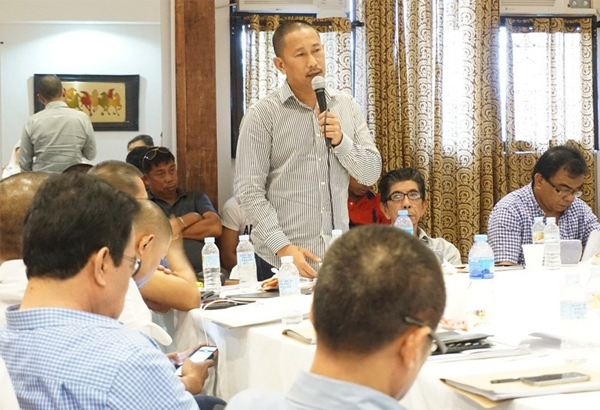
Maguindanao Gov. Esmael Mangudadatu explains to members of the provincial peace and order council the importance of diplomatic means of resolving security issues to sustain the area's improving business climate during a special meeting on Saturday in Gen. Santos City. John Unson
Members of the peace and order council in Maguindanao on Saturday unanimously endorsed two provincial security blueprints complementing Malacañang’s Mindanao’s peace process.
The council, chaired by Gov. Esmael Mangudadatu, also reaffirmed its support to President Benigno Aquino III’s ongoing peace overture with the Moro Islamic Liberation Front and to the continuing enforcement of the July 1997 government-MILF ceasefire accord.
The council, whose members include Senior Supt. Rudelio Jocson of the provincial police and Major Gen. Edmundo Pangilinan of the Army’s 6th Infantry Division, launched during their Saturday meeting here the provincial Local Anti-Criminality Action Plan (LACAP) and the Peace and Order and Public Safety Plan (POPSP), both meant to sustain the fragile peace now in Maguindanao.
The special session of the inter-agency council was held in Gen. Santos City to gather at the same time Maguindanao’s political leaders for a separate dialogue on the draft Bangsamoro Basic Law (BBL) with representatives of the Office of the Presidential Adviser on the Peace Process and Miriam Coronel-Ferrer, chair of the government’s peace panel negotiating with the MILF.
The draft BBL, now in Congress, is the enabling measure for the replacement of the Autonomous Region in Muslim Mindanao with an MILF-led Bangsamoro government.
Mangudadatu and Pangilinan both said the LACAP and the POPSP will bolster the improving peace and order in Maguindanao, where residents have been witnessing the rise of foreign-funded Cavendish and oil palm plantations in strategic areas in the province.
There has not been any single encounter between the MILF and government security forces in the province since 2010 owing to the religious enforcement of the 1997 Agreement on General Cessation of Hostilities, aimed at ensuring the cordiality of the peace talks between the rebel group and Malacañang.
Pangilinan said component units of the 6th ID in Maguindanao, which has 36 towns, are ready to embark on peace-building activities in support of the LACAP and the POPSP.
Pangilinan's deputy, Brig. Gen. Noli Orense, former commander of the 602nd Brigade based in the MILF's former stronghold, Camp Abubabar, in the tri-boundary of Maguindanao's Matanog, Buldon and Barira towns, was also present in the meeting.
Mangudadatu said the two comprehensive security plans will also hasten the provincial government’s continuing reconciliation process for feuding Moro families.
Jocson, citing reports by municipal police offices, said there has been a big reduction in recorded clannish hostilities in the past 36 months, if compared to prior years, as a result of the provincial government’s having amicably settled almost 40 bloody clan wars during the period.
“Credit has to go to the office of the governor, the local government units, the municipal chiefs of police and the military for helping one another address these family feuds via diplomatic interventions,” Jocson said.
Jocson said one of their immediate concerns now is the settlement of land disputes involving peasant families, whose enclaves are now being planted to Cavendish bananas and oil palm trees by foreign investors Mangudadatu invited to venture into the province.
“People are now busy with these agricultural projects and we’ve been hearing about some misunderstandings on property demarcations, which indicates that Maguindanaons are now focused on developing their idle lands into productive farms,” Jocson.
http://www.philstar.com/nation/2014/10/18/1381642/maguindanao-peace-council-backs-2-security-plans

No comments:
Post a Comment
Note: Only a member of this blog may post a comment.